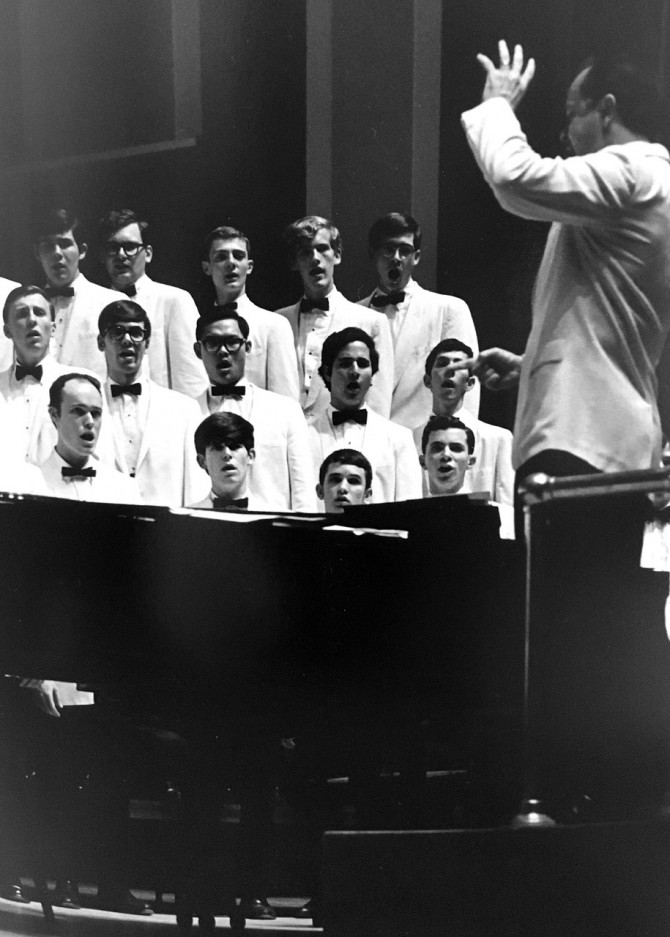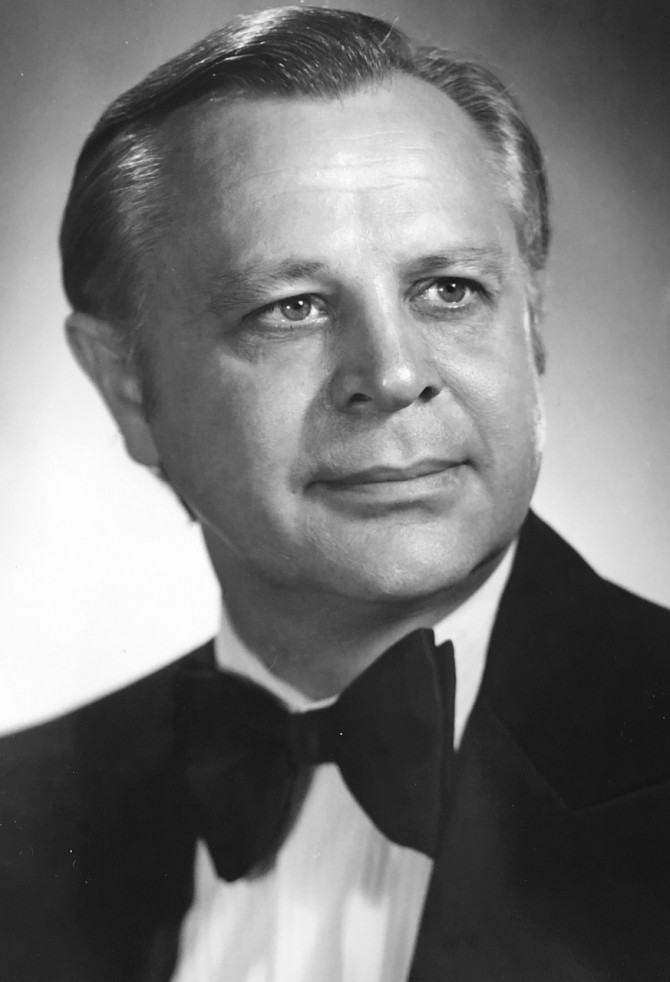Thomas Sokol, Cornell’s choral director who was given Biebl’s ‘Ave Maria,’ dies at 89
By Blaine Friedlander
Thomas A. Sokol, professor emeritus of music and Cornell’s former director of choral activities who guided the university’s Chorus and Glee Club ensembles toward demanding, expansive repertoires, died April 28 in Ithaca.
Sokol, who also was given arguably the most buoyant, poignant and popular arrangement of “Ave Maria,” was 89.
“Professor Sokol greatly broadened the repertoire that Cornell’s choirs performed – introducing them to the great masterworks of musical history, while joyfully maintaining the long-standing tradition of college songs and other lighter fare,” said Robert Isaacs, Cornell assistant professor of music and the Priscilla Browning Director of Choral Programs. “He saw the potential for excellence in students who didn’t know it yet themselves, and demanded nothing less. He held them to the highest standards of professionalism, focus and commitment, while forming strong bonds with individuals that lasted a lifetime.”
In January 1970 while on a two-week, nine-city tour in West Germany, the Cornell Glee Club recorded a program for the Frankfurt Radio Network. During the session, a faceless voice from the network’s control room praised the group’s intonation and phrasing over a loudspeaker.
When the recording session ended, Franz Biebl, the radio network’s music director, introduced himself to Sokol and handed him the sheet music of his own compositions. The music – already known locally – included an effusive, seven-part arrangement of “Ave Maria,” which was performed in the United States for the first time by the Cornell Glee Club later that year.
Biebl’s “Ave Maria,” over time, became popular worldwide as more choirs began singing it. “Composed a dozen years earlier, but not widely performed until Professor Sokol brought it back to America, ‘Ave Maria’ has become one of the most famous and beloved male choir works of the 20th century,” Isaacs said. “The piece calls for an unusually large division of voices – seven separate parts, rather than the more common four – putting every singer into their best range to bring out Biebl’s sumptuously rich harmonies.”
Sokol joined the Cornell faculty in 1957, a time when a glee club’s mission was seen as singing popular songs, ditties and novelty tunes. Sokol brought gravitas and serious musicianship to the Glee Club and Chorus, strengthening the repertoires of both groups.
In his early years at Cornell, Sokol oversaw the transition of the women’s vocal groups into the Cornell Chorus, maintaining the ensemble’s identity dedicated to treble music, which remains to this day.
“Professor Sokol was demanding, welcoming and very inspiring. He taught us to become better singers than we thought we were and to appreciate a broad variety of choral and organ music,” said Susan Reid ’65, a member of Cornell’s Sage Chapel Choir in the middle 1960s. “Rehearsals with him were energizing both on weekday evenings and Sunday mornings. No matter how tired we were or how cold the weather or deep the snow, Professor Sokol always managed to draw an excellent, punctual and enthusiastic attendance.”
The Russia Tour
In the waning days of U.S. President Dwight D. Eisenhower’s administration, in December 1960 and January 1961 – at the height of the Cold War – Sokol led the Cornell Glee Club on a two-week tour of Russia and England. The group learned Russian, French, Latin and Italian pieces as well as the Russian national anthem, Hans Leo Hassler’s “Cantate Domino” and Leonard Bernstein’s “Gee, Officer Krupke” from the musical “West Side Story,” according to The Cornell Daily Sun.
Days before Christmas 1960, the Glee Club performed at Moscow State University’s auditorium. Its 1,000 seats were oversold by 2,000. As Sokol noted: “The audience [was] enthusiastic and demonstrative.”
The Sovyetskaya Cultura newspaper reviewed the event: “For the students of Moscow State University, the artistry of their comrades from across the ocean spoke straight to the heart,” the review said. “And this is understandable; congenially to the soul, it is better to sing of peace and work, than to prepare for war.”
The Southeast Asia Tour
Four years later – as the Vietnam War intensified – the U.S. State Department invited Cornell’s Glee Club on a three-month cultural relations tour to Southeast Asia funded through the department’s now-defunct Office of Cultural Presentations.
The unprecedented tour ran from February through April 1966. Sokol and the singers traveled 37,000 miles to 10 countries, gave 49 formal concerts and as many informal performances.
The Glee Club performed in Hong Kong, Singapore, South Korea, Japan, the Philippines, Malaysia and Taiwan, among other locations. A Taiwanese general who saw a performance on television flew the entire group aboard a C-119 cargo plane to the island of Quemoy for an impromptu concert before his staff and troops in “a huge underground auditorium hewn out of the rock,” Sokol said. “The acoustics were a little different for us, but we adjusted.”
Thomas Andrew Sokol was born in Beaver Falls, Pennsylvania, on July 28, 1929, the son of John and Mary Sokol.
He graduated from Sewickley (Pennsylvania) High School, and then from Emory & Henry College of Emory, Virginia, in 1951. He received his master’s in composition and musicology in 1953 from George Peabody College.
Sokol served as an assistant choir master and assistant conductor of the Harvard Glee Club and the Radcliffe Choral Society for three years before joining the Cornell faculty. He retired in 1995.
He is survived by his current wife, Donna; his former wife, Nancy, and their five children.
Friends are welcome to join the family in a remembrance and celebration on Monday, May 6, noon to 3 p.m., at The Country Club of Ithaca, 189 Pleasant Grove Road.
In lieu of flowers, donations may be made in his name to the Cornell University Glee Club Endowment and/or the Elizabeth A. Gale Endowment Fund for Women's Chorus.
Media Contact
Get Cornell news delivered right to your inbox.
Subscribe


